What Babies Learn Before They Are Born
VerifiedAdded on 2023/06/15
|6
|1550
|338
AI Summary
This article discusses brain research and its role in understanding fetal development. It explores how fetuses learn sounds, senses of smell and taste in the mother’s womb before they are born. The article also highlights the impact of maternal nutrition on fetal growth and development.
Contribute Materials
Your contribution can guide someone’s learning journey. Share your
documents today.
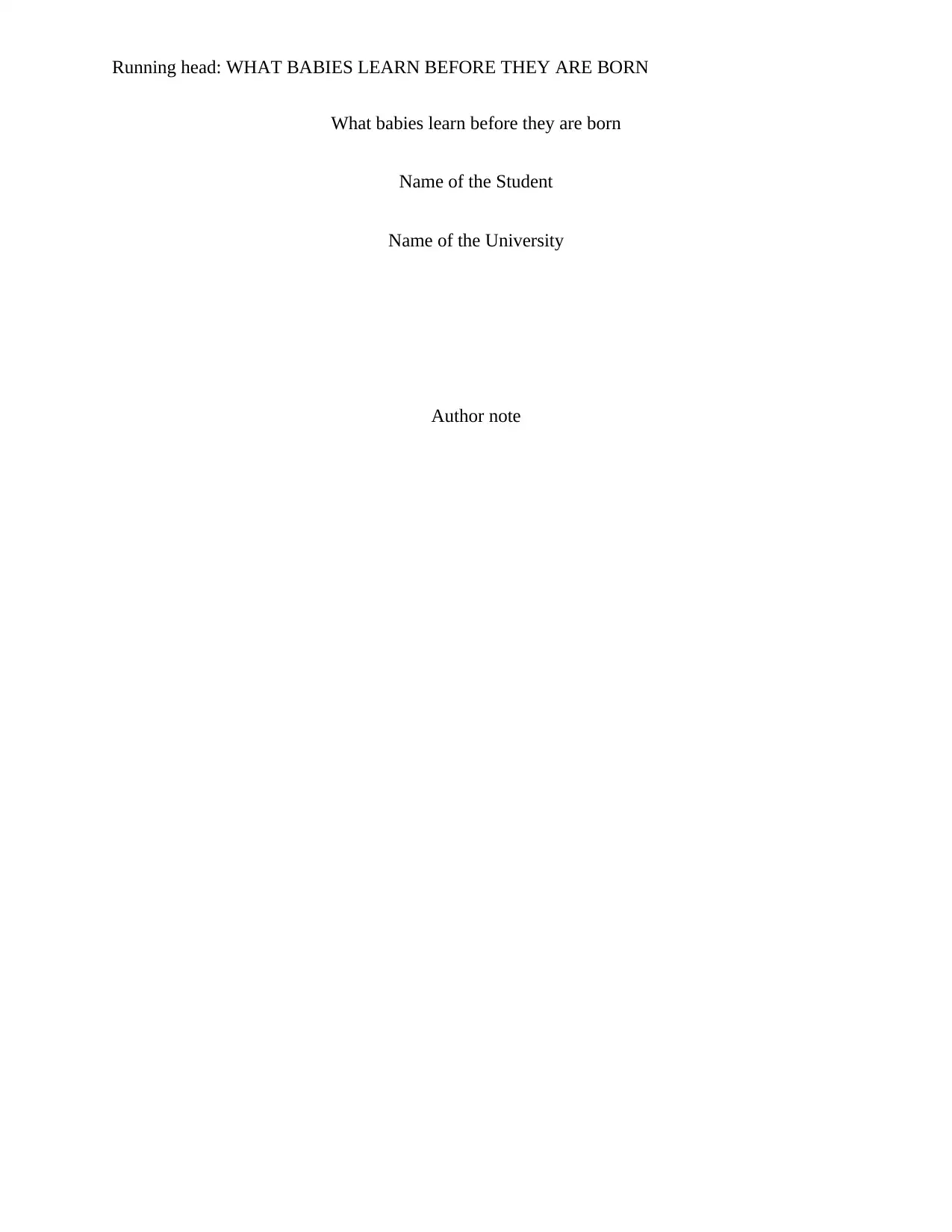
Running head: WHAT BABIES LEARN BEFORE THEY ARE BORN
What babies learn before they are born
Name of the Student
Name of the University
Author note
What babies learn before they are born
Name of the Student
Name of the University
Author note
Secure Best Marks with AI Grader
Need help grading? Try our AI Grader for instant feedback on your assignments.
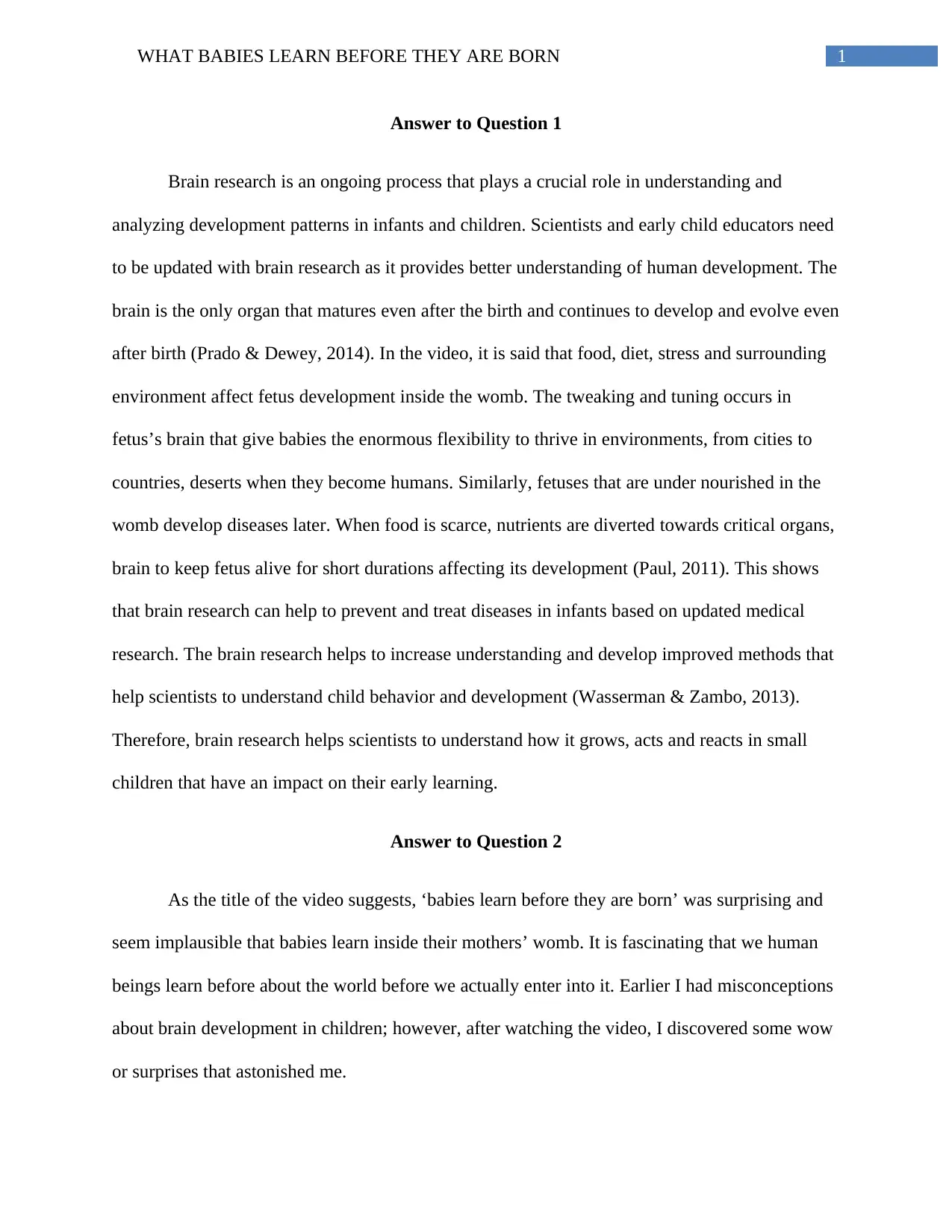
1WHAT BABIES LEARN BEFORE THEY ARE BORN
Answer to Question 1
Brain research is an ongoing process that plays a crucial role in understanding and
analyzing development patterns in infants and children. Scientists and early child educators need
to be updated with brain research as it provides better understanding of human development. The
brain is the only organ that matures even after the birth and continues to develop and evolve even
after birth (Prado & Dewey, 2014). In the video, it is said that food, diet, stress and surrounding
environment affect fetus development inside the womb. The tweaking and tuning occurs in
fetus’s brain that give babies the enormous flexibility to thrive in environments, from cities to
countries, deserts when they become humans. Similarly, fetuses that are under nourished in the
womb develop diseases later. When food is scarce, nutrients are diverted towards critical organs,
brain to keep fetus alive for short durations affecting its development (Paul, 2011). This shows
that brain research can help to prevent and treat diseases in infants based on updated medical
research. The brain research helps to increase understanding and develop improved methods that
help scientists to understand child behavior and development (Wasserman & Zambo, 2013).
Therefore, brain research helps scientists to understand how it grows, acts and reacts in small
children that have an impact on their early learning.
Answer to Question 2
As the title of the video suggests, ‘babies learn before they are born’ was surprising and
seem implausible that babies learn inside their mothers’ womb. It is fascinating that we human
beings learn before about the world before we actually enter into it. Earlier I had misconceptions
about brain development in children; however, after watching the video, I discovered some wow
or surprises that astonished me.
Answer to Question 1
Brain research is an ongoing process that plays a crucial role in understanding and
analyzing development patterns in infants and children. Scientists and early child educators need
to be updated with brain research as it provides better understanding of human development. The
brain is the only organ that matures even after the birth and continues to develop and evolve even
after birth (Prado & Dewey, 2014). In the video, it is said that food, diet, stress and surrounding
environment affect fetus development inside the womb. The tweaking and tuning occurs in
fetus’s brain that give babies the enormous flexibility to thrive in environments, from cities to
countries, deserts when they become humans. Similarly, fetuses that are under nourished in the
womb develop diseases later. When food is scarce, nutrients are diverted towards critical organs,
brain to keep fetus alive for short durations affecting its development (Paul, 2011). This shows
that brain research can help to prevent and treat diseases in infants based on updated medical
research. The brain research helps to increase understanding and develop improved methods that
help scientists to understand child behavior and development (Wasserman & Zambo, 2013).
Therefore, brain research helps scientists to understand how it grows, acts and reacts in small
children that have an impact on their early learning.
Answer to Question 2
As the title of the video suggests, ‘babies learn before they are born’ was surprising and
seem implausible that babies learn inside their mothers’ womb. It is fascinating that we human
beings learn before about the world before we actually enter into it. Earlier I had misconceptions
about brain development in children; however, after watching the video, I discovered some wow
or surprises that astonished me.
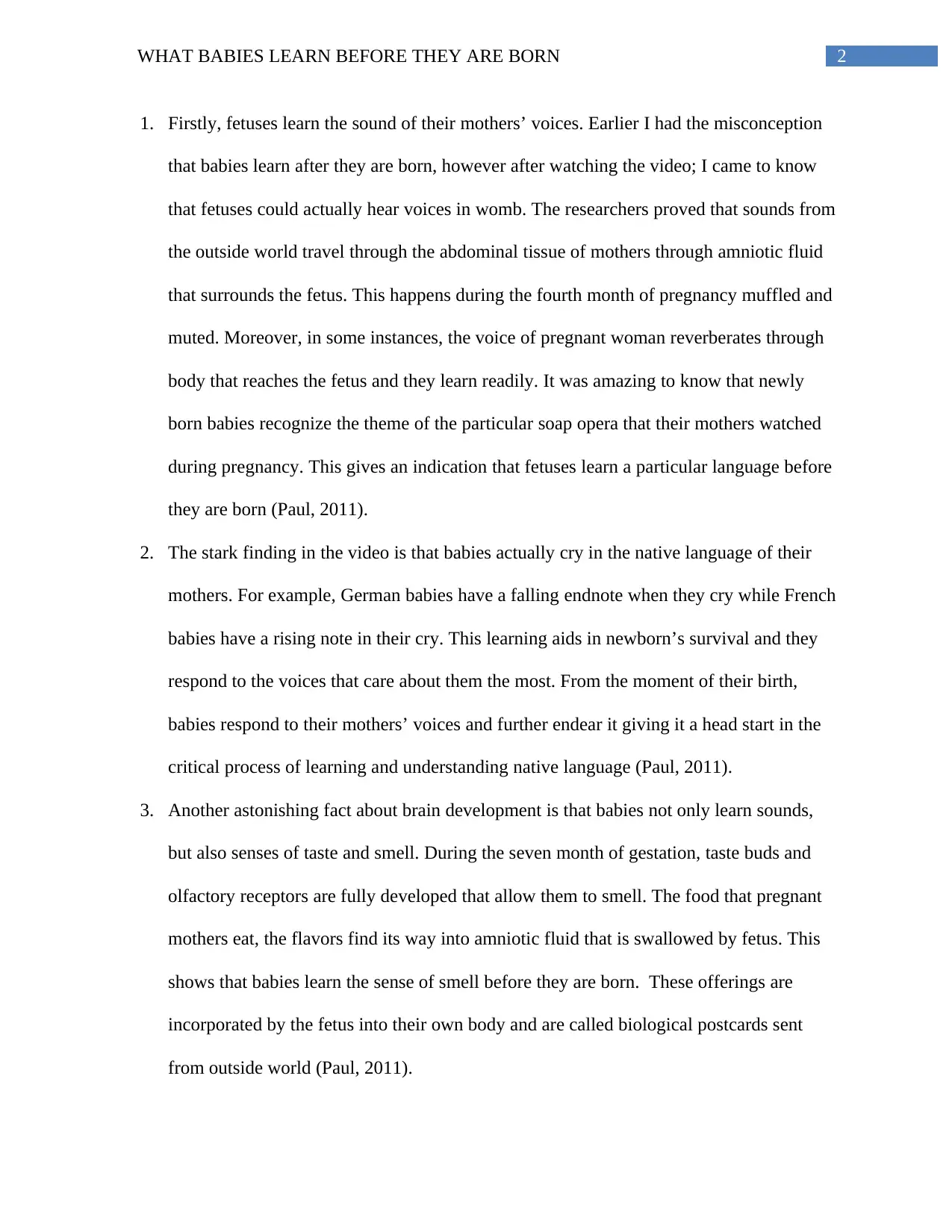
2WHAT BABIES LEARN BEFORE THEY ARE BORN
1. Firstly, fetuses learn the sound of their mothers’ voices. Earlier I had the misconception
that babies learn after they are born, however after watching the video; I came to know
that fetuses could actually hear voices in womb. The researchers proved that sounds from
the outside world travel through the abdominal tissue of mothers through amniotic fluid
that surrounds the fetus. This happens during the fourth month of pregnancy muffled and
muted. Moreover, in some instances, the voice of pregnant woman reverberates through
body that reaches the fetus and they learn readily. It was amazing to know that newly
born babies recognize the theme of the particular soap opera that their mothers watched
during pregnancy. This gives an indication that fetuses learn a particular language before
they are born (Paul, 2011).
2. The stark finding in the video is that babies actually cry in the native language of their
mothers. For example, German babies have a falling endnote when they cry while French
babies have a rising note in their cry. This learning aids in newborn’s survival and they
respond to the voices that care about them the most. From the moment of their birth,
babies respond to their mothers’ voices and further endear it giving it a head start in the
critical process of learning and understanding native language (Paul, 2011).
3. Another astonishing fact about brain development is that babies not only learn sounds,
but also senses of taste and smell. During the seven month of gestation, taste buds and
olfactory receptors are fully developed that allow them to smell. The food that pregnant
mothers eat, the flavors find its way into amniotic fluid that is swallowed by fetus. This
shows that babies learn the sense of smell before they are born. These offerings are
incorporated by the fetus into their own body and are called biological postcards sent
from outside world (Paul, 2011).
1. Firstly, fetuses learn the sound of their mothers’ voices. Earlier I had the misconception
that babies learn after they are born, however after watching the video; I came to know
that fetuses could actually hear voices in womb. The researchers proved that sounds from
the outside world travel through the abdominal tissue of mothers through amniotic fluid
that surrounds the fetus. This happens during the fourth month of pregnancy muffled and
muted. Moreover, in some instances, the voice of pregnant woman reverberates through
body that reaches the fetus and they learn readily. It was amazing to know that newly
born babies recognize the theme of the particular soap opera that their mothers watched
during pregnancy. This gives an indication that fetuses learn a particular language before
they are born (Paul, 2011).
2. The stark finding in the video is that babies actually cry in the native language of their
mothers. For example, German babies have a falling endnote when they cry while French
babies have a rising note in their cry. This learning aids in newborn’s survival and they
respond to the voices that care about them the most. From the moment of their birth,
babies respond to their mothers’ voices and further endear it giving it a head start in the
critical process of learning and understanding native language (Paul, 2011).
3. Another astonishing fact about brain development is that babies not only learn sounds,
but also senses of taste and smell. During the seven month of gestation, taste buds and
olfactory receptors are fully developed that allow them to smell. The food that pregnant
mothers eat, the flavors find its way into amniotic fluid that is swallowed by fetus. This
shows that babies learn the sense of smell before they are born. These offerings are
incorporated by the fetus into their own body and are called biological postcards sent
from outside world (Paul, 2011).
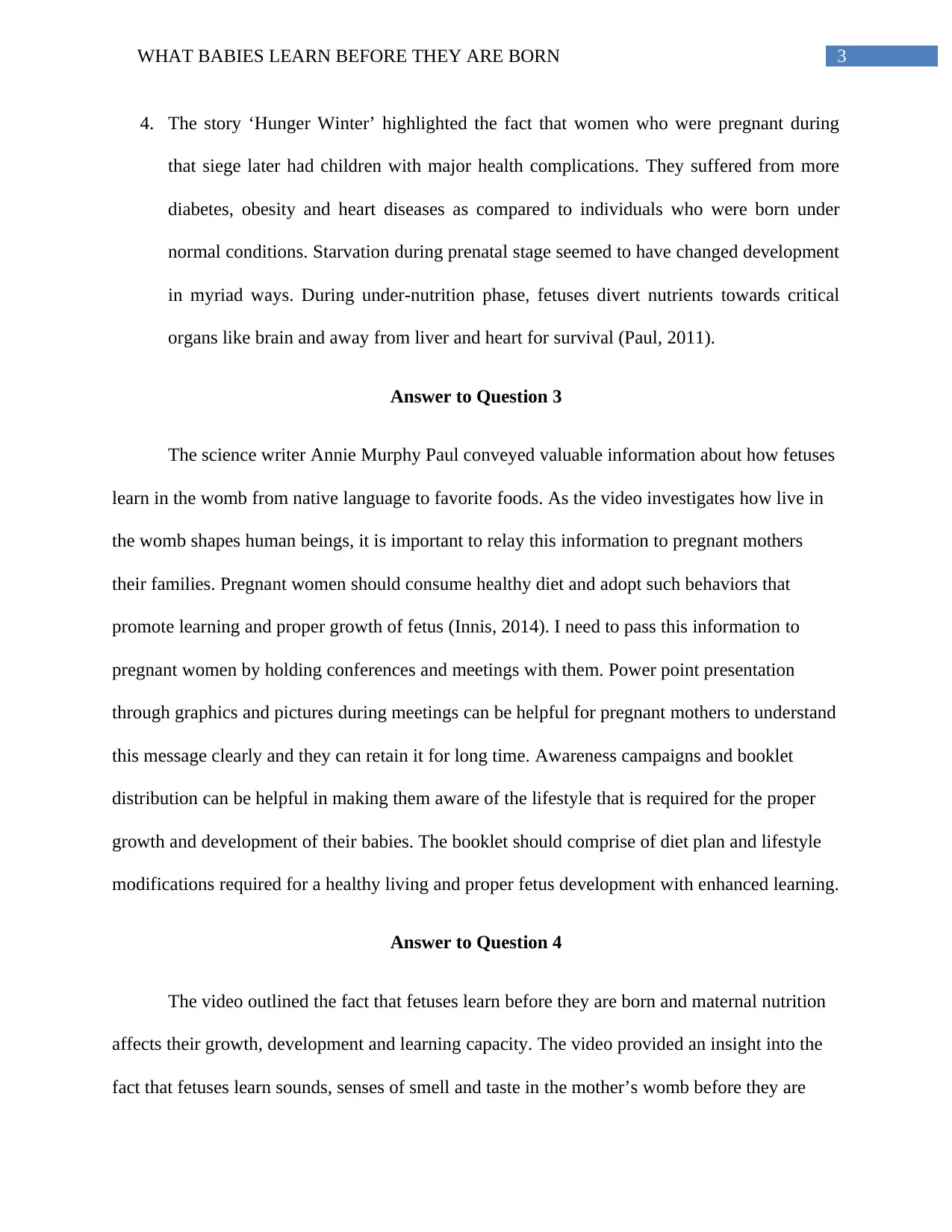
3WHAT BABIES LEARN BEFORE THEY ARE BORN
4. The story ‘Hunger Winter’ highlighted the fact that women who were pregnant during
that siege later had children with major health complications. They suffered from more
diabetes, obesity and heart diseases as compared to individuals who were born under
normal conditions. Starvation during prenatal stage seemed to have changed development
in myriad ways. During under-nutrition phase, fetuses divert nutrients towards critical
organs like brain and away from liver and heart for survival (Paul, 2011).
Answer to Question 3
The science writer Annie Murphy Paul conveyed valuable information about how fetuses
learn in the womb from native language to favorite foods. As the video investigates how live in
the womb shapes human beings, it is important to relay this information to pregnant mothers
their families. Pregnant women should consume healthy diet and adopt such behaviors that
promote learning and proper growth of fetus (Innis, 2014). I need to pass this information to
pregnant women by holding conferences and meetings with them. Power point presentation
through graphics and pictures during meetings can be helpful for pregnant mothers to understand
this message clearly and they can retain it for long time. Awareness campaigns and booklet
distribution can be helpful in making them aware of the lifestyle that is required for the proper
growth and development of their babies. The booklet should comprise of diet plan and lifestyle
modifications required for a healthy living and proper fetus development with enhanced learning.
Answer to Question 4
The video outlined the fact that fetuses learn before they are born and maternal nutrition
affects their growth, development and learning capacity. The video provided an insight into the
fact that fetuses learn sounds, senses of smell and taste in the mother’s womb before they are
4. The story ‘Hunger Winter’ highlighted the fact that women who were pregnant during
that siege later had children with major health complications. They suffered from more
diabetes, obesity and heart diseases as compared to individuals who were born under
normal conditions. Starvation during prenatal stage seemed to have changed development
in myriad ways. During under-nutrition phase, fetuses divert nutrients towards critical
organs like brain and away from liver and heart for survival (Paul, 2011).
Answer to Question 3
The science writer Annie Murphy Paul conveyed valuable information about how fetuses
learn in the womb from native language to favorite foods. As the video investigates how live in
the womb shapes human beings, it is important to relay this information to pregnant mothers
their families. Pregnant women should consume healthy diet and adopt such behaviors that
promote learning and proper growth of fetus (Innis, 2014). I need to pass this information to
pregnant women by holding conferences and meetings with them. Power point presentation
through graphics and pictures during meetings can be helpful for pregnant mothers to understand
this message clearly and they can retain it for long time. Awareness campaigns and booklet
distribution can be helpful in making them aware of the lifestyle that is required for the proper
growth and development of their babies. The booklet should comprise of diet plan and lifestyle
modifications required for a healthy living and proper fetus development with enhanced learning.
Answer to Question 4
The video outlined the fact that fetuses learn before they are born and maternal nutrition
affects their growth, development and learning capacity. The video provided an insight into the
fact that fetuses learn sounds, senses of smell and taste in the mother’s womb before they are
Secure Best Marks with AI Grader
Need help grading? Try our AI Grader for instant feedback on your assignments.
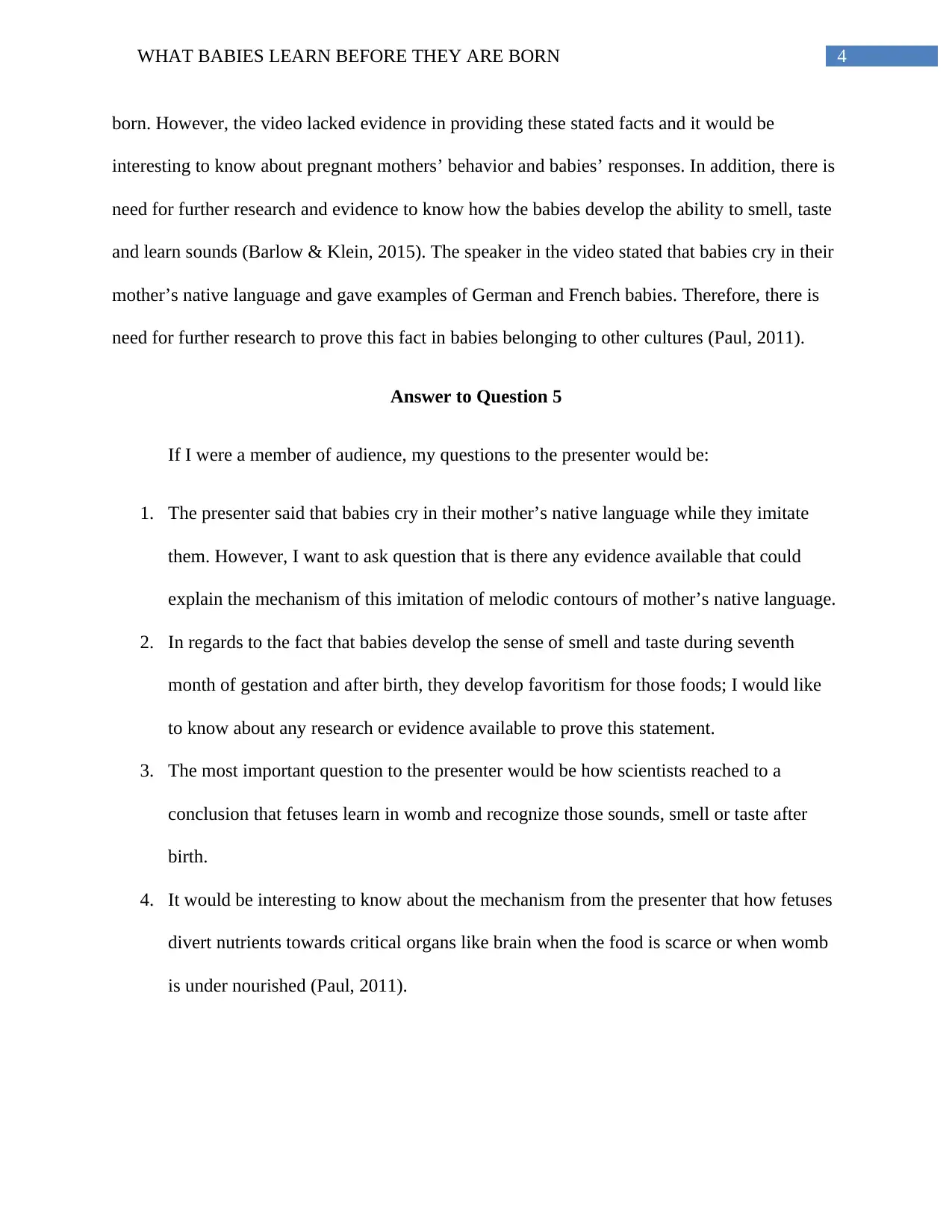
4WHAT BABIES LEARN BEFORE THEY ARE BORN
born. However, the video lacked evidence in providing these stated facts and it would be
interesting to know about pregnant mothers’ behavior and babies’ responses. In addition, there is
need for further research and evidence to know how the babies develop the ability to smell, taste
and learn sounds (Barlow & Klein, 2015). The speaker in the video stated that babies cry in their
mother’s native language and gave examples of German and French babies. Therefore, there is
need for further research to prove this fact in babies belonging to other cultures (Paul, 2011).
Answer to Question 5
If I were a member of audience, my questions to the presenter would be:
1. The presenter said that babies cry in their mother’s native language while they imitate
them. However, I want to ask question that is there any evidence available that could
explain the mechanism of this imitation of melodic contours of mother’s native language.
2. In regards to the fact that babies develop the sense of smell and taste during seventh
month of gestation and after birth, they develop favoritism for those foods; I would like
to know about any research or evidence available to prove this statement.
3. The most important question to the presenter would be how scientists reached to a
conclusion that fetuses learn in womb and recognize those sounds, smell or taste after
birth.
4. It would be interesting to know about the mechanism from the presenter that how fetuses
divert nutrients towards critical organs like brain when the food is scarce or when womb
is under nourished (Paul, 2011).
born. However, the video lacked evidence in providing these stated facts and it would be
interesting to know about pregnant mothers’ behavior and babies’ responses. In addition, there is
need for further research and evidence to know how the babies develop the ability to smell, taste
and learn sounds (Barlow & Klein, 2015). The speaker in the video stated that babies cry in their
mother’s native language and gave examples of German and French babies. Therefore, there is
need for further research to prove this fact in babies belonging to other cultures (Paul, 2011).
Answer to Question 5
If I were a member of audience, my questions to the presenter would be:
1. The presenter said that babies cry in their mother’s native language while they imitate
them. However, I want to ask question that is there any evidence available that could
explain the mechanism of this imitation of melodic contours of mother’s native language.
2. In regards to the fact that babies develop the sense of smell and taste during seventh
month of gestation and after birth, they develop favoritism for those foods; I would like
to know about any research or evidence available to prove this statement.
3. The most important question to the presenter would be how scientists reached to a
conclusion that fetuses learn in womb and recognize those sounds, smell or taste after
birth.
4. It would be interesting to know about the mechanism from the presenter that how fetuses
divert nutrients towards critical organs like brain when the food is scarce or when womb
is under nourished (Paul, 2011).
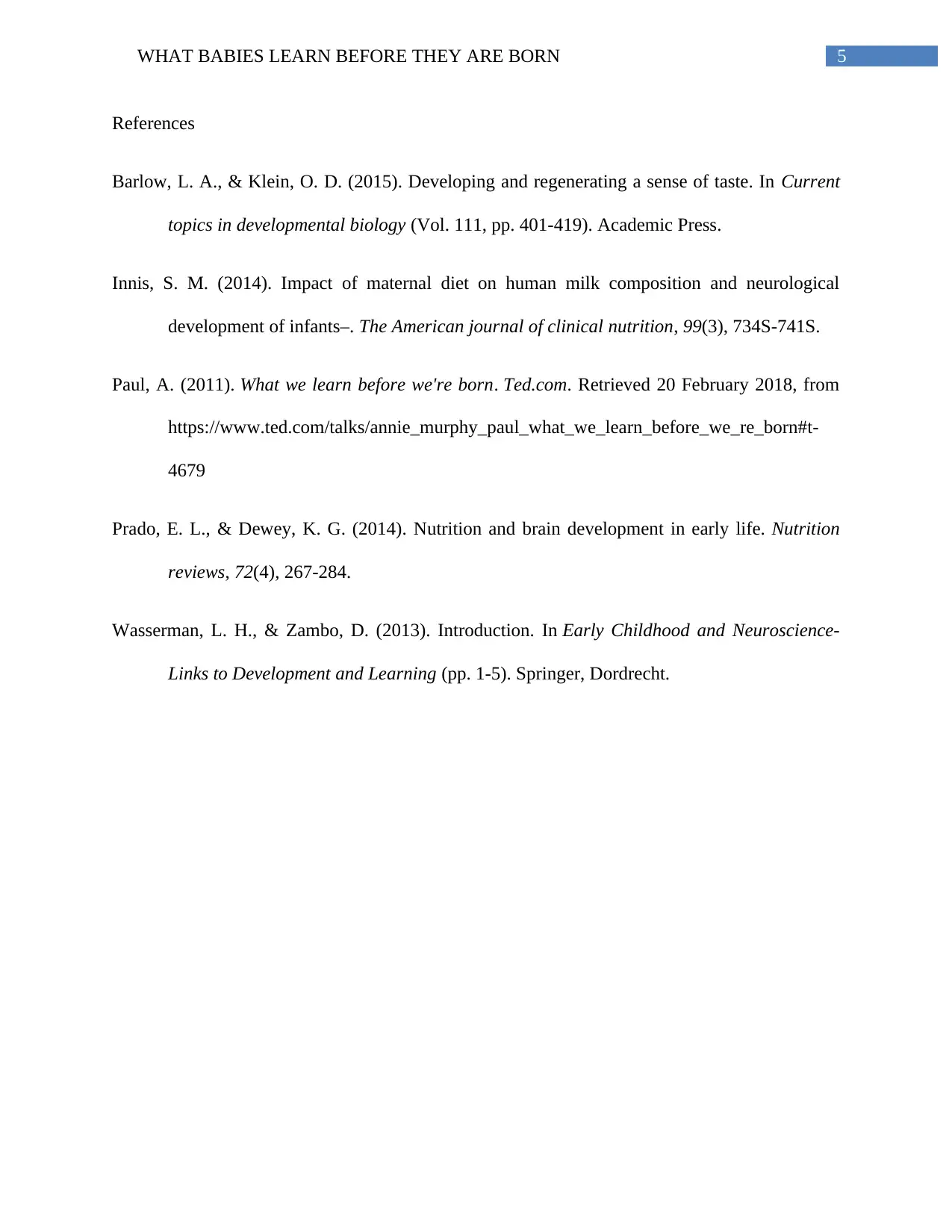
5WHAT BABIES LEARN BEFORE THEY ARE BORN
References
Barlow, L. A., & Klein, O. D. (2015). Developing and regenerating a sense of taste. In Current
topics in developmental biology (Vol. 111, pp. 401-419). Academic Press.
Innis, S. M. (2014). Impact of maternal diet on human milk composition and neurological
development of infants–. The American journal of clinical nutrition, 99(3), 734S-741S.
Paul, A. (2011). What we learn before we're born. Ted.com. Retrieved 20 February 2018, from
https://www.ted.com/talks/annie_murphy_paul_what_we_learn_before_we_re_born#t-
4679
Prado, E. L., & Dewey, K. G. (2014). Nutrition and brain development in early life. Nutrition
reviews, 72(4), 267-284.
Wasserman, L. H., & Zambo, D. (2013). Introduction. In Early Childhood and Neuroscience-
Links to Development and Learning (pp. 1-5). Springer, Dordrecht.
References
Barlow, L. A., & Klein, O. D. (2015). Developing and regenerating a sense of taste. In Current
topics in developmental biology (Vol. 111, pp. 401-419). Academic Press.
Innis, S. M. (2014). Impact of maternal diet on human milk composition and neurological
development of infants–. The American journal of clinical nutrition, 99(3), 734S-741S.
Paul, A. (2011). What we learn before we're born. Ted.com. Retrieved 20 February 2018, from
https://www.ted.com/talks/annie_murphy_paul_what_we_learn_before_we_re_born#t-
4679
Prado, E. L., & Dewey, K. G. (2014). Nutrition and brain development in early life. Nutrition
reviews, 72(4), 267-284.
Wasserman, L. H., & Zambo, D. (2013). Introduction. In Early Childhood and Neuroscience-
Links to Development and Learning (pp. 1-5). Springer, Dordrecht.
1 out of 6
Your All-in-One AI-Powered Toolkit for Academic Success.
+13062052269
info@desklib.com
Available 24*7 on WhatsApp / Email
![[object Object]](/_next/static/media/star-bottom.7253800d.svg)
Unlock your academic potential
© 2024 | Zucol Services PVT LTD | All rights reserved.
